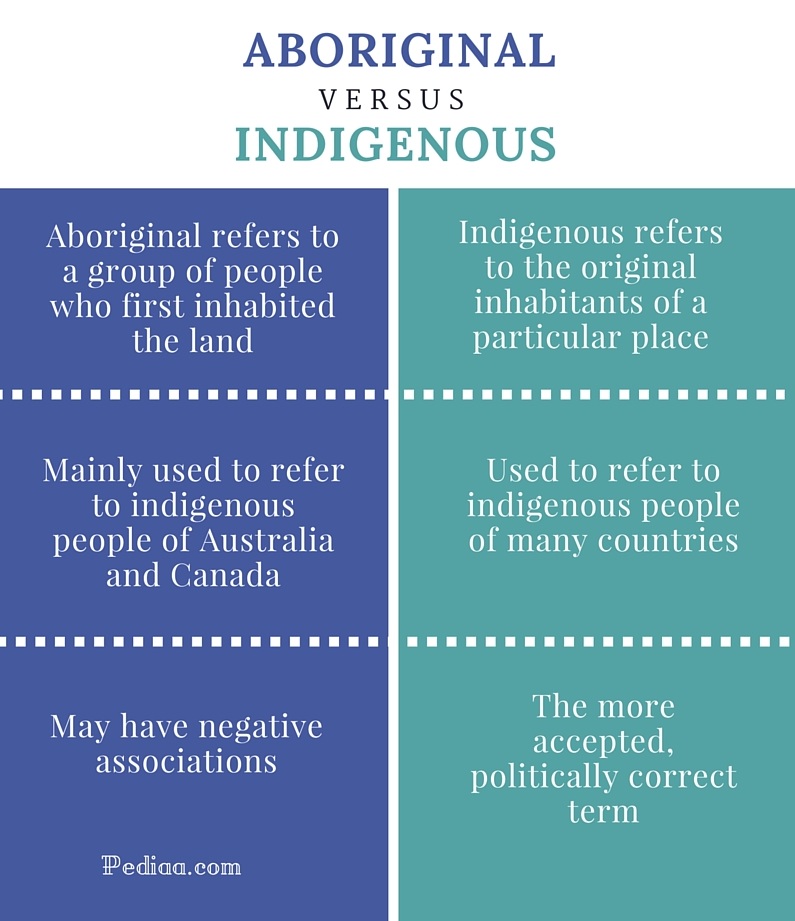Unpacking the Terms: Aboriginal, Native, and the Nuances of Indigenous Identity
Unpacking the Terms: Aboriginal, Native, and the Nuances of Indigenous Identity

The words "Aboriginal" and "Native" are often used interchangeably, leading to confusion and perpetuating misunderstandings about the diverse experiences and identities of Indigenous peoples worldwide. While both terms aim to describe those who have ancestral ties to a specific land before colonization, they carry different historical and cultural weight, and their usage can be both nuanced and sensitive. This article delves into the complexities of these terms, exploring their origins, applications, and the importance of respecting the self-identification of Indigenous communities.
Origins and Evolution of "Aboriginal"
Related Articles: Unpacking the Terms: Aboriginal, Native, and the Nuances of Indigenous Identity
- Unraveling The Threads Of Ancestry: Are Tamils Related To Aboriginal Australians?
- Unveiling The Tapestry Of Beauty: Exploring The Richness Of Aboriginal Culture
- A Taste Of Paradise: Exploring The Diverse World Of Australian Fruit
- Buzzing With Life: The Vital Role Of Bees In Our Ecosystem
- Tidam: A Powerful And Meaningful Australian Aboriginal Boy Name
The term "Aboriginal" originates from the Latin word "ab origine," meaning "from the beginning." It was initially used by European colonizers to refer to the Indigenous populations they encountered in various parts of the world, particularly Australia and Canada. The term’s usage evolved to encompass the idea of "original inhabitants" or "first peoples," implying a connection to the land that predates European arrival.
In Australia, "Aboriginal" is the officially recognized term for the Indigenous population. This term is deeply embedded in the country’s history and legal framework, encompassing a diverse range of cultures, languages, and traditions. It is considered respectful and appropriate to use within the Australian context.
The Global Usage of "Native"
The term "Native" is a broader term that encompasses Indigenous populations across the globe. It is often used in the context of Indigenous rights and self-determination, highlighting the unique relationship these communities have with their ancestral lands. The term "Native" can be used in various contexts, including:
- Native American: This term is widely used in the United States to refer to Indigenous peoples who lived in North America before European colonization.
- Native Hawaiian: This term refers to the Indigenous people of the Hawaiian Islands.
- Native Alaskan: This term is used to describe the Indigenous peoples of Alaska.
- First Nations: This term is commonly used in Canada to refer to Indigenous peoples who are not Métis or Inuit.

Understanding the Nuances and Sensitivities
While both "Aboriginal" and "Native" aim to describe Indigenous peoples, their usage can be sensitive and require careful consideration. Here are some key points to keep in mind:
- Self-Identification: It is crucial to respect the self-identification of Indigenous communities. Some groups may prefer specific terms, while others may find certain terms offensive or inaccurate.
- Contextual Sensitivity: The appropriate term to use can vary depending on the context. For example, using "Aboriginal" in Australia is generally accepted, while using "Native American" in Canada might be considered inappropriate.
- Historical Context: Both terms carry historical baggage and have been used in ways that have contributed to the marginalization of Indigenous peoples. It is important to acknowledge this history and strive for respectful language.

Beyond Terminology: Embracing Diversity

It is important to remember that Indigenous peoples are not a monolithic group. They represent a vast array of cultures, languages, and traditions, each with its own unique history and experiences. Focusing solely on terminology can overshadow the richness and diversity of Indigenous cultures.
Moving Forward: Respect and Inclusivity
When discussing Indigenous peoples, it is essential to:
- Consult with Indigenous communities: Seek guidance from Indigenous leaders and organizations to understand the preferred terminology and cultural sensitivities within specific contexts.
- Use respectful and accurate language: Avoid using outdated or offensive terms, and strive for language that reflects the diversity and complexity of Indigenous experiences.
- Amplify Indigenous voices: Create platforms for Indigenous peoples to share their stories, perspectives, and experiences.
- Support Indigenous self-determination: Advocate for policies and initiatives that promote Indigenous rights, sovereignty, and self-governance.
FAQ: Addressing Common Questions
Q: Why is it important to use the correct terminology when referring to Indigenous peoples?
A: Using respectful and accurate language is crucial for acknowledging the diversity and complexity of Indigenous experiences. It demonstrates respect for their cultures and identities, and contributes to a more inclusive and equitable society.
Q: Is it ever okay to use the term "Indian" to refer to Indigenous peoples?
A: The term "Indian" is often considered outdated and insensitive, particularly in the United States and Canada. It is best to avoid this term and use the preferred terminology of the specific Indigenous community you are referring to.
Q: How can I learn more about the specific cultures and traditions of different Indigenous groups?
A: Consult with Indigenous organizations, attend cultural events, and read books and articles written by Indigenous authors. It is important to approach learning about Indigenous cultures with humility and respect.
Q: What are some examples of respectful language to use when discussing Indigenous peoples?
A: Use terms like "Indigenous peoples," "First Nations," "Native Americans," or "Aboriginal peoples," depending on the specific context and the preferred terminology of the community. Avoid using generalizations or stereotypes, and strive for language that reflects the diversity and complexity of Indigenous experiences.
Conclusion
The terms "Aboriginal" and "Native" are not interchangeable, and their usage requires careful consideration. It is crucial to respect the self-identification of Indigenous communities and avoid perpetuating harmful stereotypes. By understanding the nuances of these terms and embracing a respectful and inclusive approach, we can contribute to a more equitable and just world for all Indigenous peoples.

Closure
Thus, we hope this article has provided valuable insights into Unpacking the Terms: Aboriginal, Native, and the Nuances of Indigenous Identity. We thank you for taking the time to read this article. See you in our next article!